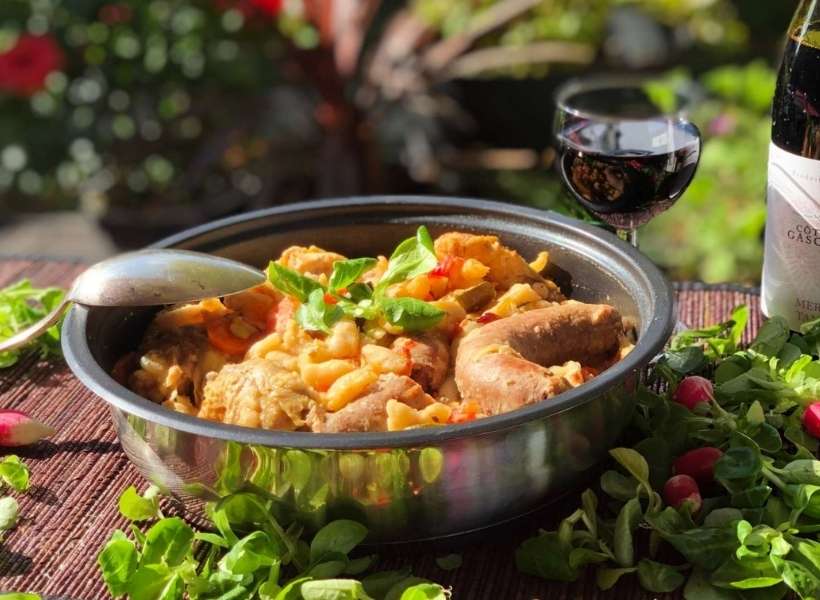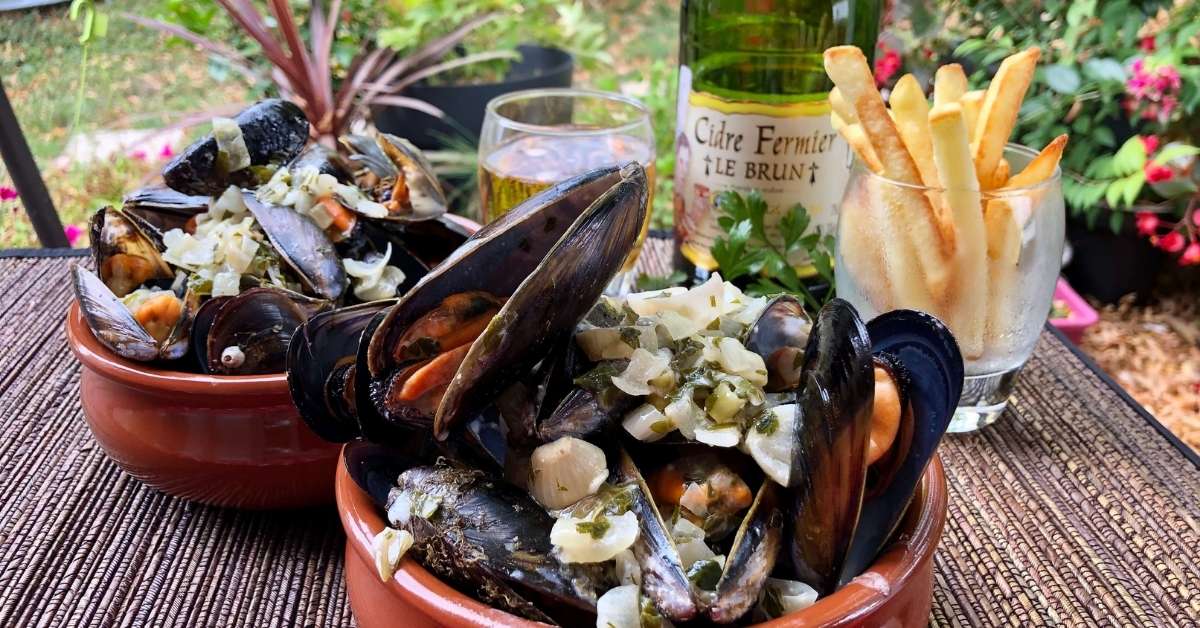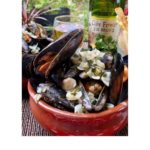This post contains affiliate links, meaning I get a commission if you decide to make a purchase through my links, at no cost to you. Please read my disclosure page for more details.
Category: French Food & Wine
I've always loved cooking and now that we can't eat out because of the pandemic, I am definitely cooking at home at lot! Aren't you? I would guess that most of us are in the same boat and can't go out to restaurants much. So we might as well make the most of it, right?
Buy Join Us at the Table
As you probably know by now, I was born and raised in France. I moved to the US for college and ended up staying for 16 years. If I wanted genuine French food I had to cook it at home because the only French restaurants around me were silly fancy and not my style at all. In Salt Lake City they have this French restaurant called La Caille that has male waiters wearing silly shorts and women wearing sexy milk maid outfits. As if! These people wouldn't know a normal French restaurant if one hit them in the face. Maybe it's changed by now, I haven't been in at least 20 years.
So I practiced cooking French meals using American ingredients. That's why I can tell you how it's done! I'm a regular French person and a good home cook. But French food still has this reputation of being fancy and difficult to make.
Some of that is reputation is warranted. Trained chefs who compete for attention and Michelin stars go to great length in their professional kitchens. The super star of French food in America, Julia Child, trained at one of the most prestigious cooking schools in Paris. These people go to great length to make amazing food because it's their job.
For the rest of us mere French mortals, we don't cook like that. We still love our classic French dishes, but we make the streamlined version at home. That's what I wanted to share with you in my new cookbook. I even put it on the cover: Easy French recipes anyone can make at home. I didn't shy away from the classics, they are achievable as well! My intention is to show you that you can do it, it's not rocket science. Have you met a French person? It's not like most of us go to cooking school! We learn at home and through practice.
In the book I recommend you read the recipe you want to try in advance and make sure you have the ingredients you'll need. But that would be the same if you were cooking Chinese food or any other food. I think cooking failures come from the lack of attention. Maybe we've seen our mothers cook and they make it look easy, surely we can just wing it, right? Not really. So read the recipe all the way through once, decide when you want to make it, and jump right in!
What's in Join Us at the Table?
When you first open Join Us at the Table you see the gorgeous book cover. I must say thank you to my friend Brenda who was on episode 124 for pointing me towards that provider and cover. When I first saw it, it really spoke to me. And even though I went looking at other covers, I kept coming back to that one because it spoke to me. Brenda is an author herself and she has been pushing me to write a book for YEARS. Thank you, my friend.
I must also thank the folks in the Secret Facebook Group who saw all the covers I was considering, voted on their favorite and told me why. I took all of that into consideration and made changes based on their comments. I decided to call the book Join Us at the Table as a tie-in to the name of this podcast and also because that’s exactly what I’d like all of you to do! Join us around a French table at least in spirit.
The subtitle is Easy French recipes anyone can make at home. I chose that because that’s really the book I wanted to write. Classic French and yet easy enough for the average person to make at home.
I have listeners all over the world too! Who knows where you are! But I know from listener stats that 95% of you are in the US, then Australia, Canada, France, then India, the UK, Ireland, Germany, Singapore and South Africa. But there are some listeners in most countries in the world.
Imperial and Metric Measurements
That’s why I included both imperial and metric measurements. Very few cookbooks do that by the way and I understand why, it’s a pain. I had to measure everything different ways and keep track carefully. I also had to round things up and down and make choices that made sense. There’s one recipe where I said use 1 cup of noodles and two testers told me that was either too much or too little. The truth is it depends on the shape of noodles you use. So, for that one I changed it to a weight measurement because that’ll work every time.
The other reason to have metric measurements is that I hope you’ll bring this cookbook to France with you when you visit. And if you rent an apartment here you won’t find cups and teaspoons measurements. Your kitchen may have a scale and a graduated container with milliliters and centiliters, but it won’t have cups.
And speaking of having different measuring standards in different countries, you know what else is different? Book publishing standards! I’ve released the book on Kindle as an eBook today. In the next few days I’ll make more versions available through Apple Books and Kobo and for the print version. But if you listen to this as soon as it’s released you won’t find all of them available just yet. Give it a few days.
But if you buy the book on Kindle you can open it on your phone and your tablet and your computer. And of course, on your Kindle reader too. The advantage to opening this cookbook on a tablet, phone or computer is that you will be able to see the photos in color whereas most Kindle readers don’t display color. You can get the free Kindle App for your computer for instance and open the book there in full color.
Adapting Classic French Foods to Various Dietary Requirements
Back to what’s in the book. After the cover, you get to the table of contents. I chose to keep the French names for these recipes. Not because I’m stuck up snob, but because French is my first language and also because I know many of the book buyers will also be Francophiles and podcast listeners. They know these recipes by their French names!
The other thing I did that I’ve never seen before is that I list variations on given recipes. There are a ton of vegan cookbooks and gluten-free cookbooks. But I know from experience that there can be people following different diets in the same household. Many of the recipes I share in this book can be made gluten-free or vegan or vegetarian just by making a few changes. I point those out as variations on a theme.
So, underneath the normal TOC you’ll find a table with all the variations. So if you’re looking for a classic French dish that can be made gluten-free or vegan you can go straight to it.
Then there’s the introduction where I tell you more about me, about my mother, about my influences when it comes to food. I also talk about French children and food. I talk about Terroir and why that matters. And I end with more practical consideration like a tip on how to protect your hands when you’re chopping vegetables. Some thank yous to close, and then we get into the recipes.
Easy French Recipes You Can Make at Home
Join Us at the Table is not a long cookbook. I didn’t want to deluge you with recipes you’ll never try. I wanted to give you just a few (28 made it to the final cut) that you can try within a few weeks. And I’ll assign a recipe per week that we’ll discuss on social media and then I’ll report on the podcast. That will start next week. I want cooking from this book to be an experience more than a thing you buy and forget.
Salad Recipes
So, the book starts with 3 salad recipes. Salade de Chèvre Chaud which I’m sure you’ve had at restaurants because it’s a classic. Would you like to have it at home? I tell you how in Join Us at the Table!
Next is the classic French vinaigrette. Have you noticed how small the salad dressing isle is at French supermarkets? That’s because we make our own salad dressings at home and I share my favorite there.
Then we move on to Salade Niçoise. Ooh, that one is marvelous and it’s one of those people like to argue about what goes in it and what doesn’t. I definitely have an opinion about that!
Then we move on to Fish. I start with Moules à la Normande, you know the lovely mussels with a creamy sauce from Normandy? Those! And it’s easy to make!
And then we go all the way across France to Nice in Provence with the Pissaladière which is a sort of pizza with lots of onions and anchovie. But it’s good also without the anchovies for vegetarians. Easy to make and not something you’ve had a million times I bet!
Appetizers
Then we move on to appetizers and I include a discussion about escargots de Bourgogne. And, one of my favorites Pain à la Tomate. I bet you’ve never had this classic Mediterranean dish and yet it is so good! Really easy, looks great to bring to a party, or when you want a special appetizer at home.
French Regional Specialties
And then the bulk of the cookbook: French regional specialties. Like I said, I do not shy away from classic French dishes because they are delicious and they’re not that hard to make at home.
Cassoulet
I start with Cassoulet. I was born and raised in Toulouse, I had to start there, didn’t I? The version I give you preserves the flavors of this wonderful dish but is a lot lighter in calories than the restaurant version.
Blanquette
Blanquette. This one is funny to me because the way chefs on TV make it, you’d think it was voodoo. It’s not! It is one of the most adaptable French classics ever!
Flammekueche or Tarte Flambée
How about we go to Alsace now with Flammekueche or Tarte Flambée? That’s one that can be made meaty or vegetarian and yum yum!
Poulet Basquaise
Now let’s go to the Basque Country together! Poulet Basquaise which you can make the classic way with chicken or if you make it without chicken it becomes Piperade. Probably the healthiest recipe in the book. Weight Watchers would approve!
Hâchis Parmentier
Hâchis Parmentier. This is the French version of Shepherd’s pie and it’s so delicious! This is one where I delve into a the history quite a lot because it’s really interesting.
Boeuf Bourguignon
Boeuf Bourguignon: this one is so famous that there are restaurants in France that serve nothing but! It’s so good some families serve it on Christmas Day. And, let me let you in on a little secret: It’s not hard to make at home!
Galettes
Back to Brittany and Normandy with Galettes Bretonnes. This one might require a bit of practice, but once you get a feel for it you can transform your home into a creperie and make Galette night the same way you’d do taco night. Really good and really versatile.
Pot-au-Feu
Pot-au-Feu: ah, this one is a personal favorite of mine. I love everything about this dish. The way the beef is cooked, the vegetables, the soup you make with the amazing broth. And, you know what? You get the same flavors if you make it vegetarian. I kid you not! Try it at home, you’ll see!
Tarte aux Blettes
Another one that I make all the time at home: Swiss Chard Pie. Swiss chard is easy to grow, it’s pretty easy to find a the store too, and it makes for a wonderful quiche-like dish that you can serve with a side salad or take to a party or make and eat over 2 or 3 days if you live alone. My daughter asks for this one all the time.
Soupe au Pistou
Then back to Provence with Soupe au Pistou. It’s the Provençal chili and is equally good with or without meat. Honestly, I don’t think the pork adds that much to it. You’ll love this one on a winter’s night!
Croque Monsieur and Croque Madame
Croque-Monsieur and Croque-Madame : so easy to make and so delicious! Turn you kitchen into a Paris bistro and make oven fries to go along with it if you’re feeding hungry teenagers.
Side Dishes
It’s time for some side dishes now!
Gratin Dauphinois
How would you like some Gratin Dauphinois? Do you know where the Dauphinois is? It’s above Provence and all the way East up against Italy. This is the French version of Potatoes au Gratin that you’ll find in America. But the French version has no cheese in it. And you know what? It’s amazing. You should make enough for 2 days because nobody ever turned their noses up at those leftovers!
Soupe à l’oignon
OK, this is one where there’s a big difference between the onion soup I ate at home growing up in France and what they serve at restaurants. I go into details in the cookbook and give you both versions. But I like the simple home version better. You should try it!
Ratatouille
And back to Provence we go with Ratatouille! That’s another one that lots of recipe authors over-complicate. It’s so easy to make! You don’t have to slave away in the kitchen for hours to eat well. Just follow my instructions!
Tian de Légumes
Tian de legumes. This is ratatouille for fancy people. It looks wonderful! It’s a little bit more work, but great for when you have company and you want to show off.
Béchamel
Then a cooking basic. How to make Béchamel. I give you 3 options: with flour, with cornstarch (which makes it gluten-free) and with broth (which makes it vegan). See, it’s all about being adaptable!
Gratin de choux fleur
This is one I make all the time. You’ll get your vegetables in and I even tell you how to not stink up your house with the cauliflower.
Salade Juive
This is in honor of my mother who made this a lot and so do I. It’s chock full of vegetables, my version is vegan, but there are lots of variations on this that I explain in the cookbook.
Desserts
And then desserts! Classic French desserts we make at home.
Clafoutis
I start with Clafoutis with its wonderful fruits.
Crêpes Maison
This is something your kids will ask for this over and over again. And it's so delicious and easy once you get the hang of it.
Crème Brûlée
I am sure you’ve had at restaurants and is so easy to make! It’s best to make it the day before you serve it, but other than that it’s so fast!
Tarte Tatin
That’s for those of you who want to impress your family for Thanksgiving. Beautiful and delicious!
Gâteau au Yaourt
And, last but not least, the cake French people make with their kids and grand kid, Gateau au yaourt.
Are you ready for easy French recipes you can make at home? Get the book and get cooking!
More episodes about French food and wine
FOLLOW US ON:
Subscribe to the Podcast
Apple YouTube Spotify RSSSupport the Show
Tip Your Guides Extras Patreon Audio ToursIf you enjoyed this episode, you should also listen to related episode(s):
- 50 Must-Know French Phrases for Hungry Visitors, Episode 161
- Traditional French Recipes for Thanksgiving, Episode 172
- Pastries of Northern France, Episode 35
- The Auvergne Cheese Route, Episode 303
- Castelnaudary, Cassoulet and Canal du Midi, Episode 300
- Summer Lunches in France, Episode 295

Category: French Food & Wine



